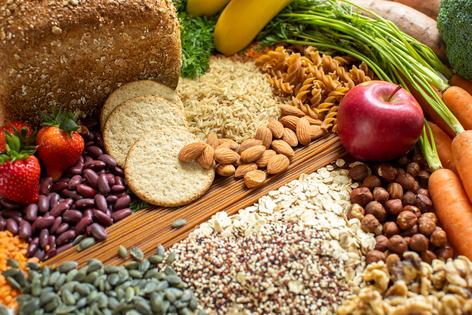Environmental Nutrition: Debunking dietary deceptions: Do carbs actually make you fat?
There are a lot of claims about why we should avoid carbohydrates, including the claim that carbs make us “fat.” But is that actually true? A closer look at nutrition suggests that the devil is in the details.
Added sugars, high-fructose corn syrup, and white flour are processed forms of carbohydrates. Carbohydrate-rich foods also include whole grains, fruits, vegetables, and legumes (beans, lentils, soy) which are unprocessed or minimally processed plant-based foods rich in vitamins, minerals, phytochemicals, and fiber. Dairy foods, which are a good source of calcium and other nutrients, contain carbs too,
Several studies have found that whole grains and fruit are associated with a reduced risk of weight gain if calorie needs are not exceeded. Also, while many studies have found low-carb diets to be more effective for weight loss than low-fat diets in the short term, in the long term, both approaches produce modest weight loss at best.
Clinical trials
A 2017 review of 32 con- trolled feeding studies found that when calories and protein are the same, there’s no weight loss benefit from eating a low carb diet over a high carb diet.
The iMPROVE clinical trial found no significant difference in weight loss between participants on a high protein diet versus a high-carbohydrate diet. Those results are similar to those of the POUNDS LOST trial 15 years ago, which randomly assigned participants to four diets that varied in levels of protein, fat, and carbs. Researchers found no difference in weight loss among the groups. Several years later, the DIETFITS clinical trial, which randomized participants to a healthy low-fat diet or a healthy low-carb diet, also saw no difference in weight change between the two groups.
Carbohydrate quality
Some research suggests that a low-fat diet high in processed carbohydrates can contribute to weight gain, but a diet with moderate amounts of nutritious, fiber-rich carbohydrates, along with healthful fats and protein, does not.
Results of a large study of U.S. adults found that moderate increases in usual amounts of starch, added sugar, refined grains, and starchy vegetables such as potatoes and corn were associated with more weight gain throughout midlife. In contrast, increasing intake of fiber, natural sugars in whole foods, whole grains, fruit, and non-starchy vegetables were associated with less weight gain.
Another 2023 study, which found that people who ate an unhealthy meat-based low-carb diet were more likely to gain weight over time than those who ate a healthier plant-based low-carb diet that emphasized whole grains, plant-based protein, and healthy fats such as olive oil.
Ultimately, rather than demonizing carbohydrates as a group, recognize that their “packaging” is what really matters. Carbohydrates in less-processed foods support a healthful diet, but when they are stripped of their original packaging, as with sugar-sweetened beverages or ultra-processed snack foods, they could lead to weight gain if eaten in excess.
(Environmental Nutrition is the award-winning independent newsletter written by nutrition experts dedicated to providing readers up-to-date, accurate information about health and nutrition in clear, concise English. For more information, visit www.environmentalnutrition.com.)
©2025 Belvoir Media Group, LLC. Distributed by Tribune Content Agency, LLC.











Comments